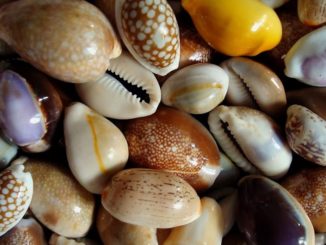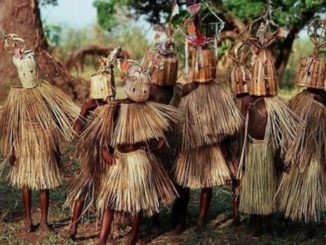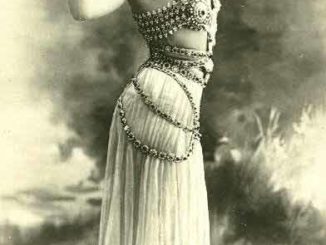
We arrived in Segu after a five hour bus ride. I was happy that we were not riding the “bush taxi”. Most of us found a spot in the rear of the bus where we hoped we could stretch out a little and relax and maybe sleep.
Leaving Bamako was a blessing in and of itself. It seemed that the bus could not leave soon enough for me. I could almost say that I hated the traffic and glare and pollution of this city. I had expected to be challenged by insects and smells and heat. I did not expect those smells to be all too familiar, the smell of diesel and burning coal and gas. The people were not really that friendly and I looked upon everyone there, with a few exceptions, with great suspicion.
The mosquitoes were tiny, persistent and irritating. Maakheru told us that in the bush, the mosquitoes were finished for the year. He complained about how in Bamako, the mosquitoes lived year round. I think he had reason to complain. Of all of us there, it was only he who contracted malaria.
The bus stopped a couple of times on the way out of the city. The first time it stopped, I got a foreshadowing of the good times to come. Vendors would enter the bus and bring in muffins, water, soda bread and anything else that a traveler might need for a long journey. A little girl came on the bus vending muffins. She was so beautiful. Her voice had the sound of bells ringing as she held up her muffins for sale. I was spell bound by the sound of that voice and the beauty of her eyes. I fumbled for my camera to snap a picture of this vision of innocence and purity.
The bus continued and I settled in as best I could to enjoy the bus ride. It was oppressively hot when the bus stopped, but when moving, a lovely breeze blew through the bus and carried away the smoke and dust and the sickening stench of Bamako, may I never see it again.
We stopped one time for a “pit stop” Several of our group got off the bus to relieve themselves, including Maakheru. He seemed to be doing better. Another of our group, Robert Conda, was almost left behind as the bus pulled off. He finally caught up with us and we continued North for Segu.
As we approached Segu, the Djoliba river came into view on our left. Just a few tantalizing glimpses as we traveled down the road at a respectable pace, passing the occasional donkey cart or bush taxi on the way.
We pulled in to the bus station in Segu, and I was prepared for another dusty polluted experience, but thankfully, we had left such things behind. A small contingent of porters and vendors assaulted us as we unloaded our bags and accumulated them into a pile as Maakheru went off to find us accommodations. I was still worrying about the computers that we were lugging along with us. We had not sold a single one and I was working very hard to find a formula in my mind to break the grip of the depression that was snapping at my heals.
Malik hovered around me like a mother hen, continuing to assure me that the laptops would be sold. He had offered the most promising buyer, who had said that they would meet us at the bus station, that he would pay for transportation if he came to Segu to make the purchase. “Please, I don’t want to hear bout it anymore until somebody is in front of us with the money.” Malik looked a little hurt, but I think he understood. I had not wanted to lug these computers through the bush on the way to Ouaga, but I realized that I would have little choice.
I decided that it was time for me to start my pilgrimage.
The bus station in Segu was clean and well tended. The buildings were freshly painted and the people were friendly. The vendors were not too persistent as they seemed to realize that we were more interested in ending this leg of our journey. Maakheru came back with a couple of young men and a boy bearing a hand carts. It turned out that one of them, a handsome young man with a confident bearing and beautiful blue-black skin, was also of Dogon lineage.
It was but a short walk around the corner, and we soon found ourselves stepping into a very pleasant courtyard. A canopy of woven grass stretched across from left to right. A table was set up in the corner of the front porch of a small hotel, which was only a step above ground level. Chairs were set up under the canopy and a small tree grew in the center of the courtyard with an earthen jar sitting next to it containing drinking water and a small statue that wore a necklace of cowry shells.
The building was painted yellow. A set of double doors led to what could be a great room or sleeping room with a kitchen off to the right. I noticed there were cow horns jammed into the door and strategically placed at various locations throughout the building. There was a set of stairs leading up to the roof of the building that I wanted to explore.
The courtyard continued around the building to an area in the back where we found a faucet for water, and further a walled in area for showering and relieving oneself. Khefira and MenZeba quickly made a bee line for this area. Khefira was apparently looking forward to her first outdoor shower of the trip with great anticipation.
Three or four young men greeted us obsequiously in the courtyard. The young Dogon was among them, and Makheru began negotiating a price for our stay. This was the first of several such negotiations that I would observe. When the deal was finally done, we all pulled our bags from the cart and placed them on the left wall of the great room as one of the young men proceeded to drag futons in and place them on the floor.
I climbed the stairs to the roof and found a very pleasant space with a view of a lot below where a couple of elderly men were weaving huge straw barrels under the shade of a couple of trees. As I stood there, I could see how all of the buildings were connected together in a warren of brick walls and passageways that was compact and efficient. Children played in the small courtyards and I could see into some of the open windows where woman were busy doing some chore or other.
An occasional motor scooter would travel up and down the dirt road outside the entry way to our hotel and everything seemed to be moving at a very leisurely pace. I felt myself relaxing with every breath and an emotion filled me that until then had been a faint memory. Tears filled my eyes as I realized that I was truly happy in a way that I had not been since my childhood. I looked up into the clear blue sky and felt the sun shining down on my face like a mother caressing a baby. I was truly home.
I banked my emotions and went downstairs to see what was going on with everyone else. Maakheru was asking if we would like to pay a couple of dollars each to have some music that evening. “Do you want to pay some dollars to be pampered with music tonight?” he asked. I was the first person to speak up. I had little money, but this seemed like something that would be worthwhile to spend it on.
Khefira and Zeba had completed their shower and were busy making sandwiches for us from left over fish and fresh vegetables that they had saved from the day before in Bamako. We had acquired fresh plain baguettes, which seemed to be a staple food in Mali.
A little while later, some of the guys from Segu came by and brought some djembes. A djembe is a traditional African drum that found its origin many years ago here in Mali. One of the guys, who Maakheru had nick named “Ja Rule” because of his resemblance to the rapper sat down with Bass and Maakheru to play. This was a wonderful time. Maakheru was still a bit weak from the malaria and he had a very persistent cough, so he had little energy to play for very long.
Ja Rule’s real name was Papu. Later in the day Papu was playing the djembe on the roof with Bass and I joined them. Papu sat me down with a djembe and showed me a simple beat that I stumbled through for a while. He began to sing and Bass joined in. Justice, a brother from the New York School joined us on the roof and I turned over my djembe to him. I pulled out my harmonica and tried to pick out a tune.
Justice stands about 6’1″ and is only a year younger than I. He’s a big guy like me and has been involved with the study of African spirituality for many years but has only been studying with the earth center for about a year. At first, Justice seemed kind of stand-offish. He kept to himself in the airport and also in Bamako. Segu had worked its magic on him as well and here he began to open up and spend more time interacting with everyone else in the group much more than before.
That night a group of performers came by our little compound. There were two djembe players, one player of the tum tum, which is a stick drum that is used to keep the beat and three beautiful women. One woman brought a European man with her who appeared to be her boyfriend. The leader of the group was an incredible djembe player. As he played, the women would spontaneously get up and dance traditional party dances.
I had experienced something like this before in Chicago at the 63rd street beach on the South Side. There is a drum circle that forms there most every night in the summer and especially on the weekends. Many Africans come there to play and dance. This was a smaller version of the same, but the dancing and the drumming was more coordinated and much better.
Zeba, a member of our group dances semi-professionally in Chicago with the Najua dance troop and she allowed the other women to convince her to join the dance. She seemed hard pressed to keep up with the drummers but seemed to enjoy her self immensely. She soon lost her shyness and danced with the other ladies.
I have rarely seen and heard such beautiful sites. The sky was clear and the moon shown down brightly thought it was not entirely full. The drummers hands moved so fast sometimes that they were only a blur and were matched in speed only by the feet of the dancers. At one point, one of the drummers removed his shirt revealing a lean physique and took over the dance. Everyone whooped and hollered as he moved with a powerful grace that made me wish that I were capable of such things, but that would only be a dream for me.
Soon another member joined the group. He was a young man who was severely crippled. He could not stand up straight at all and moved from one place to another on all fours using sandals to protect his hands. He was just as friendly as everyone else and clearly quite strong and comfortable in his skin. All the other members of the troop treated him as an equal. He too took the floor to dance as well.
His dance was not clumsy or graceless. It had an energy and joy for life that left me dumbfounded. In America, he would have been marginalized and denigrated, but here, he was strong and accepted. I have never experienced this and I felt somewhat ashamed of my own initial reaction to his presence.
Soon the main djembe player began to serenade each of us. Well… I don’t think serenade is the right word, because it was more a display of his virtuosity. Upon completion, we would give him our payment for the performance. He did something with the djembe that I had never seen before. He took a glass and slid it along the head of the drum with one hand while striking the drum with the other. It gave the djembe the character of a talking drum where he could change the pitch at will.
Makheru finally came up to the roof as the main djembe player was finishing his rounds. Makheru is himself a master drummer so I knew that it would take much to impress him. The main drummer pulled every trick out of his book, seeming to realize that Makheru was our leader and the man to impress. Makheru sat in his chair wrapped in a blanket unimpressed, until the made the djembe talk. It was after this that Makheru offered him his payment. Later Makheru proclaimed him to be “Very good”.
Proudly WWW.PONIREVO.COM
Source by Rezib Tutsanai’i



